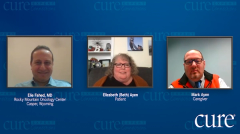
Multiple Myeloma: The Importance of a Patient’s Support Network
Elie Fahed, MD, and Beth describe the multiple lines of social and professional support Beth received and also gave to others throughout her journey with multiple myeloma.
Episodes in this series

Elie Fahed, MD: Let’s talk a bit about multidisciplinary management of multiple myeloma. I’m a medical oncologist, so I’ve been probably your main contact at the cancer center. I’m your main treatment decision maker, but I don’t do it alone. We work closely with radiation oncology, and radiation oncologists can help a lot when we have isolated lesions causing symptoms from multiple myeloma or even plasmacytoma because this kind of disease is very responsive to radiation. I sometimes feel that they’re underutilized for management.
Did we work with other specialists? For the prior treatment, we needed ophthalmology and optometry to help us with the eye examinations. Were any other specialists involved in your management over the years? I think we had a transplanter, but we didn’t use them for a long time. They treated you early on. In the future, if we’re going to do CAR [chimeric antigen receptor]-T cell therapy, we’re probably going to rely on a transplanter because that’s not something I foresee doing locally in the next few years, and you will probably need to travel to get that treatment.
Elizabeth Ayen: Right. Other than that, I’ve seen a pulmonologist because of pulmonary hypertension. Other than that, I can’t think of anybody. Mark, can you? I don’t think so.
Elie Fahed, MD: Alright. Tell us who your support was throughout your journey. We understand that Mark was your greatest, No. 1 supporter and helper. Was there any other support network you had around? Family, friends, coworkers?
Elizabeth Ayen: Yes, family was definitely the first line of support, and then our church family was huge in all the places that we’ve lived. They provided us with meals and house cleaning, and they helped take care of the kids when they were small. Those kinds of things were always amazing. When I started working, my coworkers were very helpful. We had moved one time, and I just couldn’t do it. I was not strong enough to help with the move or clean the house after we moved out. They came and did that for us.
I can also tell you that one of my biggest support teams has been the nurses in oncology. They’re like my family, and I always say that place is like my Cheers. As soon as I walk in, everybody knows my name, and everybody’s saying, “Hi.” That is a huge thing for me, to feel supported and liked as a person, and that everybody’s concerned about me. I can’t even express to you how important that has been over the years.
Elie Fahed, MD: It’s not only the nurses. We’re all big fans, and believe it or not, I have other patients with myeloma who are cheering for you and are excited about your progress. You talk back in the infusion room or share your experiences, but they’re all excited by how well you’re doing. You probably give them hope for their own treatment or their own future.
Elizabeth Ayen: Yes.
Elie Fahed, MD: Tell me more about your discussions with other patients at the center, on Facebook, or in other support groups.
Elizabeth Ayen: Yes. I’m in two myeloma support group pages on Facebook. That has been really helpful, talking back and forth about what new treatments are out, what people are doing, and how they’re responding to their treatments. You find out that everybody’s different and everybody responds differently. It is also helpful to see what could come up. What might this be like? That has been really helpful.
We support each other and encourage each other through the journey. I had never met another patient with myeloma until about three years ago when there was a man at the oncology center who I met. After that, I met two or three others. The first man I met is not online at all, and he’s not up on any of the new therapies. I was able to help with that a bit and talk about what I was doing. It gave him some hope of what could come for him later. So it’s been great to have some conversations with people who have it because we’re in such a small area in Wyoming.
Elie Fahed, MD: It is a small group of patients. Multiple myeloma is a rare disease. Less than 1% of patients will have it, and I can tell you that you’re helping those patients. They’re all excited, they all share their conversations with you, and they’re all optimistic. That’s great.
This transcript has been edited for clarity.
